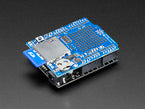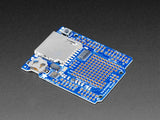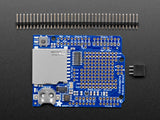Here's a handy Arduino shield: we've had a lot of people looking for a dedicated and well-designed data logging shield. We worked hard to engineer an inexpensive but well-rounded design.
Our latest version of this popular shield has all the features of the popular original, and is "R3" compatible so you can use it with just about any Arduino or compatible. You can be up and running with it in less than 15 minutes - saving data to files on any FAT16 or FAT32 formatted SD card, to be read by any plotting, spreadsheet or analysis program. The included RTC (Real Time Clock) can be used to timestamp all your data with the current time, so that you know precisely what happened when!
Please note that this item does not come with an Arduino (you'll need one to use with the shield), SD card or coin cell battery! The shield comes with all the components soldered on and tested but does not have headers installed. You'll need some basic soldering skills to put it together, but even if you don't have much experience you can get it done in under 15 minutes.
- SD card interface works with FAT16 or FAT32 formatted cards. 3.3v level shifter circuitry prevents damage to your SD card
- Real time clock (RTC) keeps the time going even when the Arduino is unplugged. The battery backup lasts for years
- Included libraries and example code for both SD and RTC mean you can get going quickly
- Prototyping area for soldering connectors, circuitry or sensors.
- Onboard 3.3v regulator is both a reliable reference voltage and also reliably runs SD cards that require a lot of power to run
With this new version you can use it with:
- Arduino UNO or ATmega328 compatible - 4 analog channels at 10 bit resolution, 6 if RTC is not used
- Arduino Leonardo or ATmega32u4 compatible - 12 analog channels at 10 bit resolution
- Arduino Mega R3 or ATmega2560 compatible - 16 analog inputs (10-bit)
- Arduino Zero or ATSAMD21 compatible - 6 analog inputs (12-bit)
- Arduino Due - 12 analog inputs (12-bit)
TECHNICAL DETAILS
- Dimensions (assembled): 70mm x 53mm x 17mm (2.7in x 2in x 0.65in)
- SD Card protrudes by 10mm (0.4in) when inserted
- Weight: 22g/0.8oz
- The RTC uses I2C 7-bit address 0x68.
- Datasheets, EagleCAD PCB files and Fritzing objects in the tutorial











